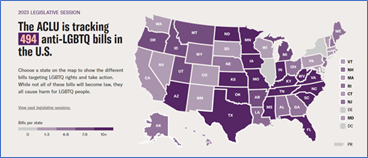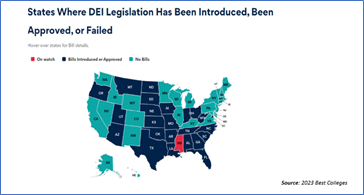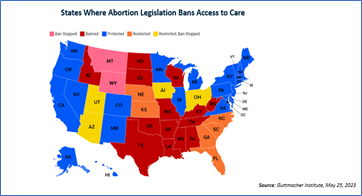ACA 2025 Conference & Expo in Orlando FAQs
Oct 4, 2023
The American Counseling Association will continue with its longstanding plan to host its 2025 Annual Conference & Expo in Orlando, Florida. In a letter to members, ACA President Edil Torres Rivera, PhD, and CEO Shawn Boynes shared the rationale behind this decision:
“Nine years ago, when we booked our meeting in Florida, many of the recently enacted laws that discriminate against marginalized communities were not in place. Within this current landscape, however, ACA has received inquiries from members about our longstanding plan to host the 2025 conference in Orlando after the recent spate of ‘anti’ laws were enacted. After careful consideration, analysis and robust deliberation by Governing Council and staff, it was decided to proceed with our plans to host the meeting in Orlando. This decision was made for several reasons, including one central belief: that being present will be a more impactful statement than cancelling, especially if we use our collective voices to advocate for the change we want to see.”
Read on for more frequently asked questions about the 2025 meeting.
Why was Orlando chosen and why was it booked so far in advance?
Orlando is a popular tourist destination that offers attendees many options for recreation and entertainment outside the conference events. We know some attendees look for opportunities to combine work and play when they attend the Conference & Expo, and we’ve historically selected cities that have a host of restaurant, cultural and family-friendly options to explore.
To secure the best rates on rooms and conference/meeting space, organizations often book far in advance, sometimes up to a decade or more before the proposed meeting date. This allows organizations to control costs, plan activities and avoid additional expense due to inflation, rising prices, etc.
What goes into the selection of meeting locations for the ACA Conference & Expo?
When planning ACA events, central considerations include:
- Accessibility — How easy is it to get in and out of the city? How many potential attendees are there within driving distance? Is it easy to find flights in and out of the city?
- Location — Is it local to a large portion of our membership? Is the city big enough in terms of hotel rooms and convention space to host ACA? Have we been to this city before? Is it a city that people have previously rated highly in post-meeting surveys?
- Cost — What is the cost of the convention space and hotel meeting spaces we’ll need to host our meeting? Convention and meeting space that is too high can raise the cost of registration, which we try to avoid.
- Room Rates — We make all efforts to secure attendee room rates of less than $300/night. This rules out many expensive cities (such as New York City, San Francisco, Los Angeles, Washington, etc.). We have opportunities in other markets, such as Orlando and New Orleans, with more affordable options for our attendees.
Why didn’t ACA boycott Florida and cancel hosting the meeting in Orlando?

Simply put: After careful consideration, we believe we can affect more positive change in our presence instead of our absence. Additionally, boycotts aren’t always effective. In September 2023, California also repealed its ban on government-sponsored travel to states with laws that discriminate on the basis of sexuality or gender, replacing it with state-funded publicity campaigns in those states promoting LGBTQ+ equality. Legislators acknowledged that the ban had not worked the way it was intended.
We also understand that our members in Florida don’t have the luxury of boycotting. They are living with and counseling clients in the face of these laws every day. ACA leadership felt that while canceling sends a strong statement, it really doesn’t impact the change many want to see in these destinations. We can make a much more powerful statement and bigger impact by going and supporting our members and their clients who live and work in the community.
How will ACA consider meeting locations as “anti” laws continue to be enacted across the country?

We won’t always be able to avoid states and regions with legislation misaligned with our Code of Ethics. Many states have concerning “anti” laws, and options for booking viable destinations aren’t as available as people may assume.
Figuring out how to go into these spaces, stand up for what ACA values, and leave them better than we found them will be critical. These are never easy decisions.
How does ACA plan to make an impact in communities that have enacted discriminatory laws?
 We will put a focus on advocacy for counselors and the people of Florida, especially those targeted by discriminatory laws. Planning is underway to decide the best ways to contribute to existing advocacy efforts in a way that will be most useful and impactful for the targeted communities. Our intent is to partner with the Florida Counseling Association and the Southern Region to best support counselors and clients. We are also looking at ways to have a more significant impact in the communities we visit prior to 2025. Look out for details of advocacy efforts planned for the 2024 Conference & Expo in New Orleans.
We will put a focus on advocacy for counselors and the people of Florida, especially those targeted by discriminatory laws. Planning is underway to decide the best ways to contribute to existing advocacy efforts in a way that will be most useful and impactful for the targeted communities. Our intent is to partner with the Florida Counseling Association and the Southern Region to best support counselors and clients. We are also looking at ways to have a more significant impact in the communities we visit prior to 2025. Look out for details of advocacy efforts planned for the 2024 Conference & Expo in New Orleans.
ACA decided to change venues for its 2016 conference in Nashville, Tennessee, due to concerning laws in that state. Why is the response different for Orlando given Florida’s laws?
The circumstances around the Nashville event were very different than those in Florida and other states. In the prior instance, the Tennessee Legislature was considering a bill (which subsequently passed) that essentially attacked the nondiscrimination section of the ACA Code of Ethics. The bill was targeted specifically at ACA as the Tennessee licensing board used the ACA Code of Ethics. No matter how heinous we may feel the current bills are in Florida, they are not targeting ACA or counselors in the aggregate, although they do impact some counselors and some of the clients we serve.
The financial implications of moving the Tennessee conference were sizable and long lasting due to the penalties incurred for canceling and the extra costs associated with last minute booking in a new, more expensive city. ACA paid prime rates and had limited choices. The organization was committed to certain hotel chains for years afterward to help ameliorate the penalties for canceling, which increased room rates that we were able to offer attendees.
What efforts will ACA make to ensure the safety and security of attendees while in Florida?
We understand that the current environment in Florida is one that may cause some individuals, including people of color and the LGBTQ+ community, to feel unsafe. We also recognize that personal comfort levels around traveling to and staying in Florida factor into people’s decisions in whether to attend the Conference & Expo.
Individual safety is not something ACA — or any organization — can guarantee, especially outside the meeting venue. However, ACA will work to increase security to provide a greater sense of safety within the conference facilities, in addition to upholding the ACA Code of Conduct, which outlines acceptable conduct at in-person events and provides details of how to report misconduct.
